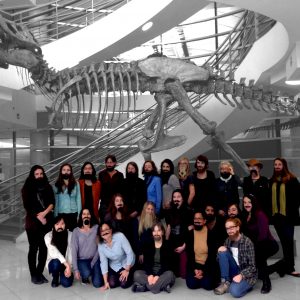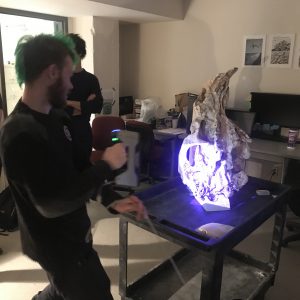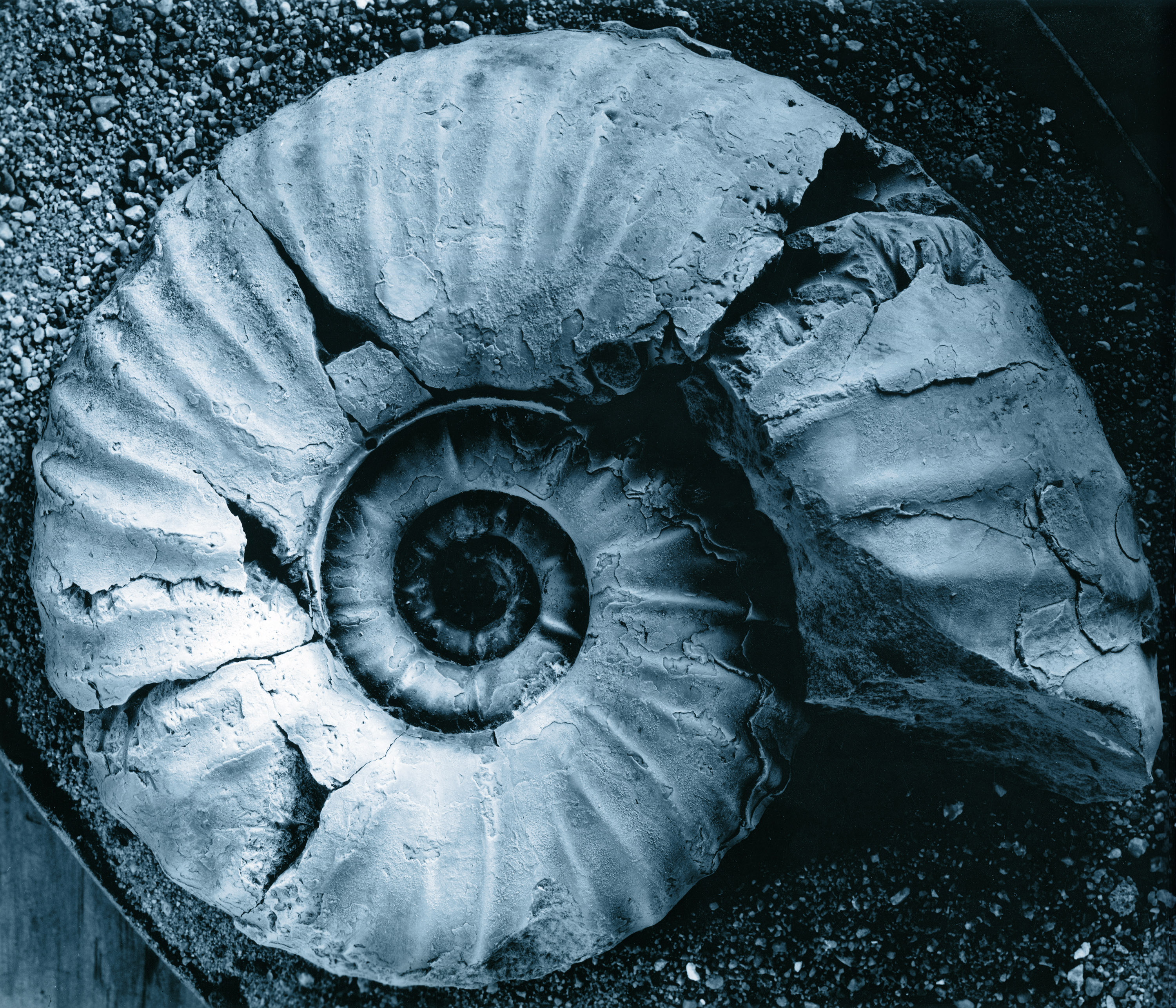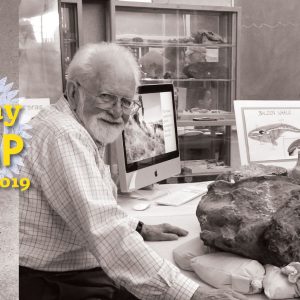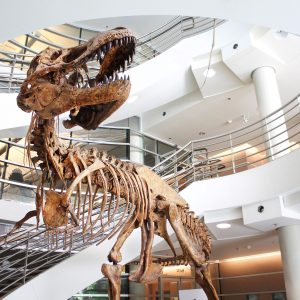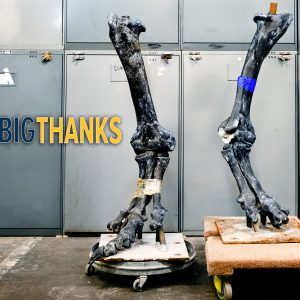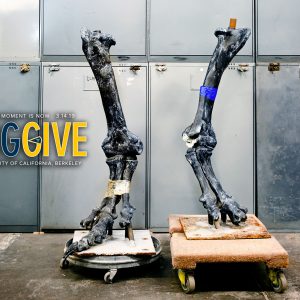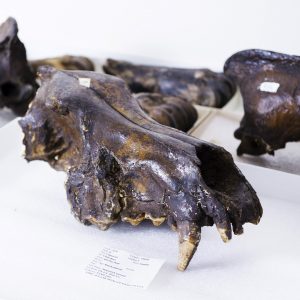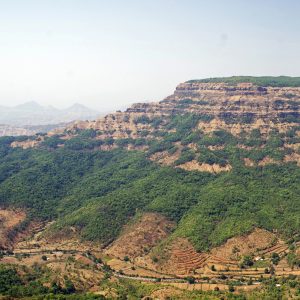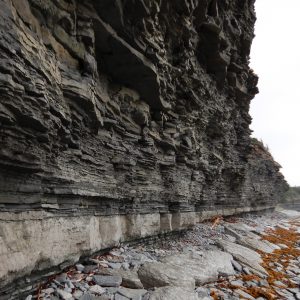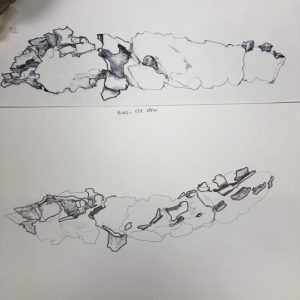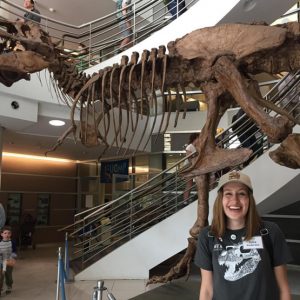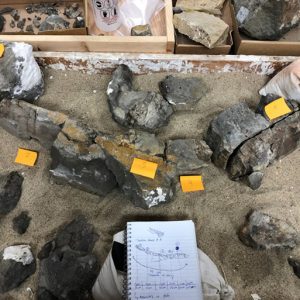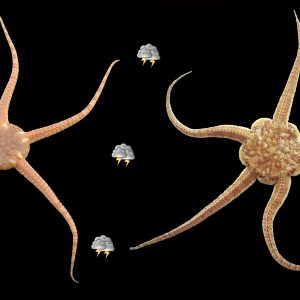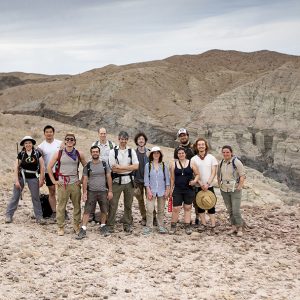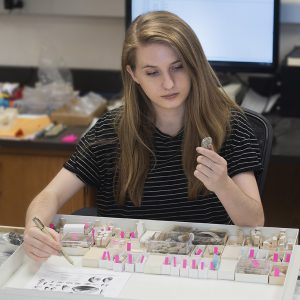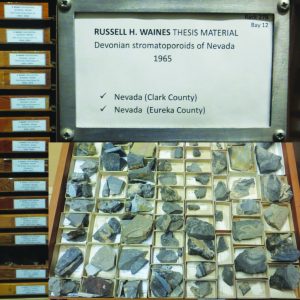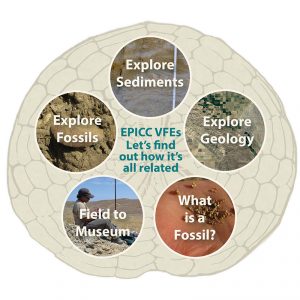In February 2015, The Bearded Lady Project film and photography team boarded a plane and flew to San Francisco. They were carrying a peculiar cargo: 30 beards and mustaches that they picked up at their regional theater prop shop. During their three days on the UC Berkeley campus at the UC Museum of Paleontology (UCMP), they interviewed and photographed about 30 UCMP paleontologists wearing beards. The participating UCMP graduate students, faculty members and museum scientists all had one thing … [Read more...] about The Bearded Ladies Go Berkeley
Latest News
Fossil Feature: Multituberculates
The UCMP has one of the best collections of multituberculates, a small mammal from the Cretaceous characterized by their very interesting and very bumpy teeth. Luke Weaver, a PhD candidate from the Wilson Lab at the University of Washington visited the museum in Summer of 2018 to check out the collection and further his own research into these interesting creatures. His visit was supported in part by the Doris O. and Samuel P. Welles Research Fund. Check out the video for more on these … [Read more...] about Fossil Feature: Multituberculates
Researchers from Down Under come to UCMP to study our Australian fossils
Kangaroos … in Berkeley? That’s right, mate. You won’t find them leaping around the campus, though. Because they’re in the Museum of Paleontology’s fossil collections. In the 1950s, then-curator and professor Ruben A. Stirton decided to go to Australia’s Tirari Desert to look for fossil marsupials. He wanted to find evidence to answer the question of the origin and spread of marsupials through space and time. Did they come from Australia, Antarctica, or … [Read more...] about Researchers from Down Under come to UCMP to study our Australian fossils
Louderback Fund Annual Meeting
The annual business meeting of the George D. Louderback Fund's board of directors will take place Tuesday morning, May 21. If you are interested in attending please contact kpadian@berkeley.edu for details. … [Read more...] about Louderback Fund Annual Meeting
Join us for CalDay 2019!
Join us on Saturday, April 13, from 9am-4pm for Cal Day. A full schedule of events can be found on the Cal Day Events website. … [Read more...] about Join us for CalDay 2019!
NorCal Paleo registration is open!
Update April 1: registration is still open! NorCal Paleo is on Saturday, April 6. As a conference run by students for students, the focus of NorCal Paleo is on student research and professional development. NorCal Paleo provides an ideal venue for students to showcase their research, gain feedback from leading California scientists and network with both their peers and future advisors and employers. NorCal Paleo is focused on all things paleo, including paleontology, paleoecology, … [Read more...] about NorCal Paleo registration is open!
Big Thanks!
Thank you! Whether you contributed a gift, a social share, or both during the Big Give in support of UCMP research, teaching, and education, we thank you for being part of the campaign. Big Give provides an opportunity for the UC Berkeley community of alumni, students, faculty, staff, and friends to show their support for public education and world-class research. If you donated to the UCMP during the Big Give, we’ll send you a letter of thanks with more details about the impact of your … [Read more...] about Big Thanks!
UCMP Big Give on Pi Day!
It's Pi Day! We hope you will consider a gift to the UCMP during the campus Big Give, a fundraising campaign on Pi Day, Thursday, March 14. Every gift received will directly support research, teaching, and education at the UCMP. DONATE TODAY! Research in Global Change Biology * World Class Collections * Education and Outreach Workshops * Graduate Student Support * Celebrating 25 Years of Web Resources … [Read more...] about UCMP Big Give on Pi Day!
Are There Dinosaur Bones in UC Berkeley’s Campanile?
KQED's Bay Curious asks: are there dinosaur bones in UC Berkeley's Campanile? UCMP's Pat Holroyd and Leslea Hlusko answer this question. … [Read more...] about Are There Dinosaur Bones in UC Berkeley’s Campanile?
Asteroids or volcanoes?
UC Berkeley alumnus Courtney Sprain and Berkeley Geochronology Center Director Paul Renne are lead authors on a report in Science detailing new argon-argon dating of the Deccan Traps in India. Their work on the timing of the Cretaceous-Paleogene extinctions relative to the Chicxulub impact and Deccan flood basalt eruptions remains the subject of exciting, ongoing research. Read more in the Berkeley News Center … [Read more...] about Asteroids or volcanoes?
25 years of the UCMP website
Forgive us. We nearly didn’t notice until late 2018 that the year marked the 25th anniversary of the UCMP website! We decided that early 2019 was a good time to celebrate that milestone since the site is undergoing a somewhat radical redesign, only the fourth big design change in its history. We felt that this was also a good time to look back at those 25 years and pick out some of the highlights. I contacted website founders Rob Guralnick, currently Associate Curator of Biodiversity … [Read more...] about 25 years of the UCMP website
Reading between the rocks: Reinterpreting the Late Ordovician mass extinction
This past summer, I had the opportunity to conduct my first field season on Anticosti Island (Québec, Canada). Located in the subarctic of Canada, Anticosti Island preserves a 200 kilometer-long transect of ancient seafloor. Late Ordovician tropical reefs and fossils are beautifully preserved across the island in towering coastal cliffs and river canyons. The sheer size of the island is astounding, and the insight its fossil record could provide into early Paleozoic marine communities is … [Read more...] about Reading between the rocks: Reinterpreting the Late Ordovician mass extinction
Science and the arts are not incompatible
Working in a paleontology prep lab as an Anthropology major who leans towards cultural analysis was something that seemed out of left field for me. I was sitting in the corner of a lab that was strewn with rocks and fossils that I didn’t know yet were fossils for my job interview, and I was asked to give more detail on my experience in art. I didn’t really expect it to be something that would be so important to my job here at the Museum of Paleontology, but my experience outside of the “hard … [Read more...] about Science and the arts are not incompatible
Working in the UCMP fossil prep lab
Throughout my whole life I have known that I would make my passion my career someday. However, the road to success in vertebrate paleontology can be a rocky one (no pun intended), sometimes without direction or opportunity. Fortunately, the University of California Museum of Paleontology seeks to help aspiring scientists, such as myself, obtain hands-on experience in the field of paleontology! My name is Julia Anderson, and I am a senior undergraduate student, actively seeking my place amongst … [Read more...] about Working in the UCMP fossil prep lab
The Tale of Sandbox Whale
One of the exciting projects we worked on in the prep lab was the assembly of the remains of a whale skull, known as "Sandbox Whale". The project, from its plaster jacket beginnings to the finished product, relied on various skills that we have learned in the prep lab. I find that most of our projects, like the Sandbox Whale, require creativity and patience. The opening of the rigid plaster jacket required the use of wet rags to loosen the jacket so we could rip it open. This is a clever … [Read more...] about The Tale of Sandbox Whale
How often does extreme competition occur between species on the ocean floor?
Look around in nature or even in the city and you will see that organisms are not static entities, but interact with one another. Think of a robin with a worm in its beak, a tick crawling on your leg looking for a spot to puncture your skin, or two bucks fighting during the rutting season for the right to mate. The sea floor is also a place where animals search or fight for food to stay alive. On the continents, food is not unlimited; every individual tries to collect a piece of the pie (Fig. … [Read more...] about How often does extreme competition occur between species on the ocean floor?
2018 Spring Break Field Trip
Four states, nine days, 2,850 miles, 48 hours cumulative driving and enumerable sponges. The Field Methods in Paleobiology Course, also known as the 2018 Spring Break Field Trip, from March 24, 2018 to April 1, 2018, was a whirlwind tour of the Southwest with IB Faculty/UCMP Curators Cindy Looy, Ivo Duijnstee and Seth Finnegan leading a group of students, a professor on sabbatical and one staff member to West Texas to the explore the ancient Capitan Reef formation in and around Guadalupe … [Read more...] about 2018 Spring Break Field Trip
UCMP now has over 100,000 cataloged invertebrate specimens
Thanks to our recent digitization projects, UCMP now has topped 100,000 cataloged invertebrate specimens! At least 6500 of these are fossil insects, millipedes and spiders digitized by Dr. Diane Erwin and undergraduate students under Berkeley's Fossil Insect PEN. Helping make all this possible was the work by the following participants: Dr. Marwa Wafeeq Abdelkhaliq Ibraheem (Ain Shams University, Egypt; volunteer), graduate students Winnie Hsiung and Rosemary Romero, as well as undergraduate … [Read more...] about UCMP now has over 100,000 cataloged invertebrate specimens
Russell Waines’ stromatoporoid collection
Russell H. Waines was a geologist who dedicated most of his life to ancient sponges, the stromatoporoids, which were one of the most important reef builders during the Paleozoic. When I was a graduate student researcher at the UCMP in 2013, I had the pleasure of organizing this collection (Figure 1), which includes approximately 2000 fossil specimens (566 of which are registered in the UCMP database) mainly from the Devonian of Nevada, but also from Alaska, Arizona, California, New York, Utah, … [Read more...] about Russell Waines’ stromatoporoid collection
EPICC Virtual Field Experiences
The EPICC project (Eastern Pacific Invertebrate Communities of the Cenozoic) is pleased to launch the first suite of virtual fieldwork experience (VFE) modules set in the Kettleman Hills near Coalinga in Central California. Using high-resolution images, high quality panoramas, photographs, and video clips, supported by easy to understand text, we bring to life the field to museum connection for general and classroom audiences. There are five modules: Explore Geology Explore Sediments … [Read more...] about EPICC Virtual Field Experiences
